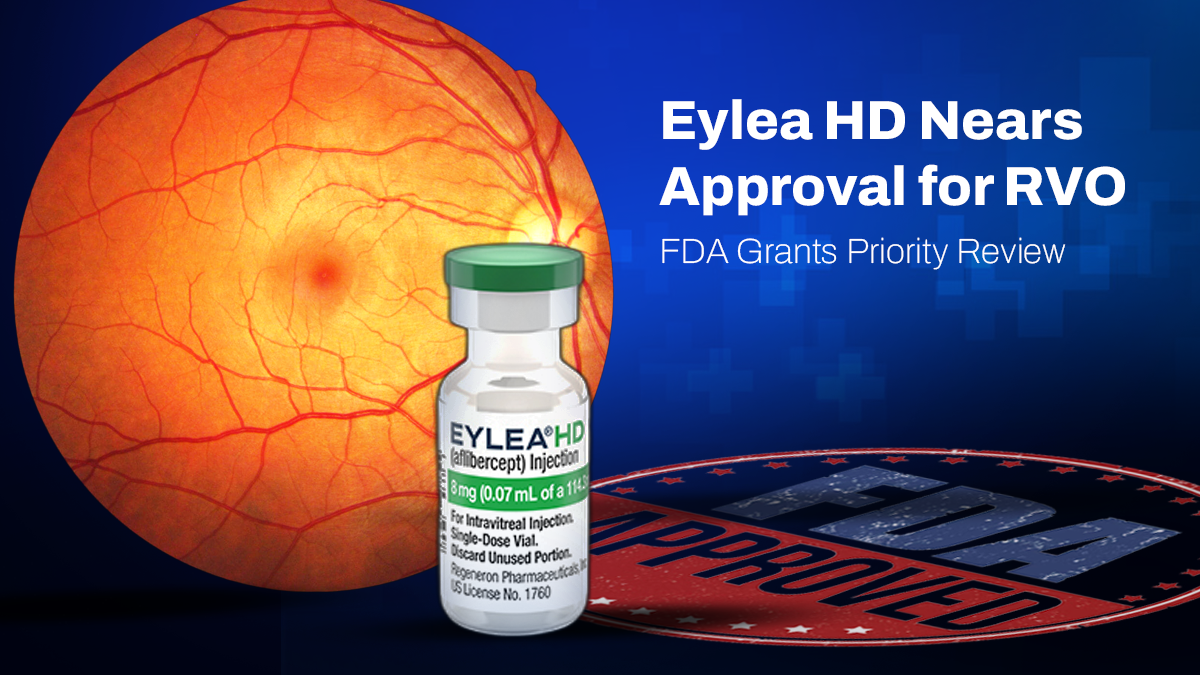QUASAR Phase III study data show higher-dose aflibercept could reduce injection frequency for retinal vein occlusion patients.
Bayer (Leverkusen, Germany) and Regeneron’s (New York, United States) blockbuster anti-VEGF, Eylea HD (aflibercept 8mg), could soon have a key new role in retinal vein occlusion (RVO) management.
The U.S. Food and Drug Administration (FDA) has accepted Regeneron Pharmaceuticals’ supplemental Biologics License Application (sBLA) for aflibercept 8mg with Priority Review status, potentially expanding treatment options for patients with retinal vein occlusion (RVO) and offering more flexible dosing across approved indications.
If approved for RVO, Eylea HD would become the first anti-VEGF therapy indicated for up to eight-week dosing intervals after an initial monthly loading period.
The application, announced on April 17, seeks approval for two distinct uses: treating macular edema following RVO and allowing four-week dosing across all approved indications. The FDA has set a target action date of August 19, 2025, following Regeneron’s use of a Priority Review voucher.
READ MORE: Bayer’s Eylea 8mg Makes Huge Regulatory Strides Worldwide
Potential breakthrough for RVO treatment
Approval of aflibercept 8mg for RVO would represent a key advancement for retinal specialists, as all currently approved anti-VEGF treatments for RVO—including the standard Eylea (aflibercept 2 mg)—require monthly injections.
The application is supported by data from the Phase III QUASAR trial, which met its primary endpoint at 36 weeks, demonstrating that patients receiving Eylea HD every eight weeks (following either three or five monthly loading doses) achieved non-inferior visual acuity improvements compared to those receiving standard Eylea 2 mg monthly.
The Eylea HD results were consistent across patients with branch RVO, and those with central retinal or hemiretinal vein occlusions.
Consistent safety profile
According to the trial data, aflibercept 8mg’s safety profile remained generally consistent with the established profile of aflibercept 2mg.
Among 591 QUASAR patients receiving aflibercept 8mg (compared to 301 receiving aflibercept 2mg), increased ocular pressure was reported in 5% of 8mg patients versus 1.7% of 2mg patients.
The trial reported one case each of endophthalmitis and retinal vasculitis in the aflibercept 8mg group, compared to two cases of endophthalmitis and no retinal vasculitis in the 2mg group. No cases of occlusive retinal vasculitis were reported with either treatment. Intraocular inflammation rates were 0.5% with aflibercept 8mg and 1.3% with aflibercept 2mg.
READ MORE: The Rise of Anti-VEGF Biosimilars and Biobetters
Expanding treatment options
Eylea HD represents Regeneron’s effort to build upon its established aflibercept platform while addressing the treatment burden associated with frequent injections in RVO—a common theme in the use of anti-VEGF in the management of exudative retinal disease. The higher-dose formulation was developed to maintain comparable efficacy and safety while reducing injection frequency.
The drug is currently approved in the U.S. for neovascular age-related macular degeneration (nAMD), diabetic macular edema (DME), and diabetic retinopathy (DR). Outside the United States, Bayer markets the product.
READ MORE: Bayer’s Aflibercept 8 mg Eyes Six-Month Stretch Between Treatments
The FDA’s decision on this application could potentially expand treatment options for patients with retinal vascular diseases, offering physicians greater flexibility in managing these chronic conditions.
Editor’s Note: See Regeneron’s press release on the acceptance of Eylea HD for RVO and monthly dosing for more information. This content is intended exclusively for healthcare professionals. It is not intended for the general public. Products or therapies discussed may not be registered or approved in all jurisdictions, including Singapore.



